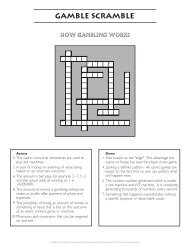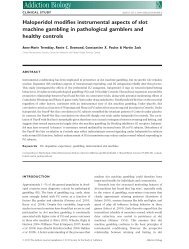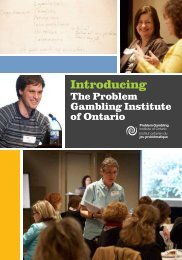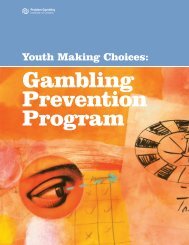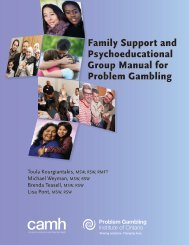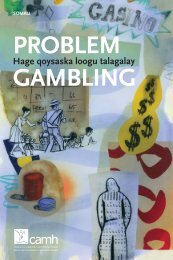Problem Gambling: A Guide for Helping Professionals
Problem Gambling: A Guide for Helping Professionals
Problem Gambling: A Guide for Helping Professionals
Create successful ePaper yourself
Turn your PDF publications into a flip-book with our unique Google optimized e-Paper software.
<strong>Problem</strong> <strong>Gambling</strong>: A <strong>Guide</strong> <strong>for</strong> <strong>Helping</strong> <strong>Professionals</strong><br />
Risk of Suicide<br />
People who gamble excessively and their families have higher rates of<br />
suicide. The risk of suicide increases <strong>for</strong> people who also have mental<br />
health problems or problems with alcohol or other drugs. People who<br />
have threatened suicide or have a history of self-harm are also more<br />
at risk.<br />
Clients may have thoughts of suicide if they:<br />
• talk about suicide and say they have a plan<br />
• show changes in behaviour, appearance or mood<br />
• seem depressed, sad or withdrawn<br />
• give away prized personal objects<br />
• prepare <strong>for</strong> death by making a will or telling final wishes.<br />
Steps to take:<br />
• Stay calm and listen carefully to better understand what is happening.<br />
• Let them talk about their feelings. Accept what they are saying without<br />
passing judgment or trying to solve their problem.<br />
• Ask clients specifically if they are feeling suicidal and have a plan.<br />
• Take all suicide threats seriously.<br />
• Encourage clients to remove any available means of self-harm (e.g.,<br />
firearms, medications).<br />
• Direct clients to the nearest emergency department <strong>for</strong> assessment, or<br />
encourage them to get professional help from a crisis centre, counsellor<br />
or doctor.<br />
• Do not promise to keep the person’s suicidal thoughts confidential.<br />
22





